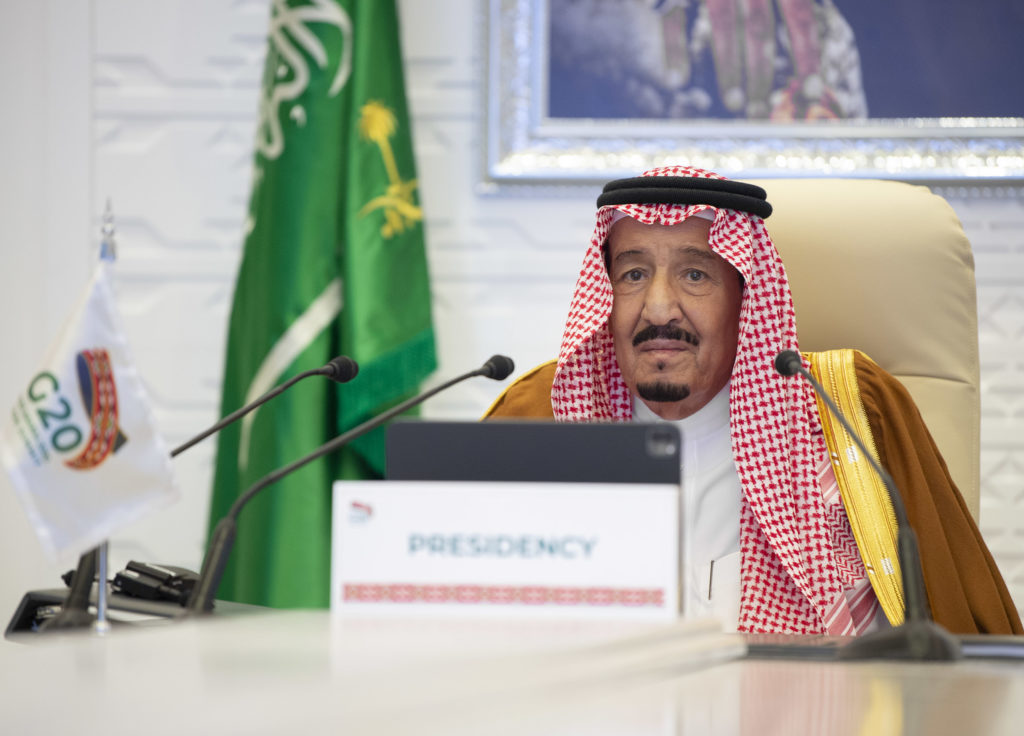São Paulo – In his opening remarks in the G20 Summit on Saturday (21), Saudi king Salman bin Abdulaziz Al Saud discussed the role of the member countries in the fight against the pandemic, vaccine, medicine and test production and distribution to low-income countries, and a more inclusive post-COVID world, and how to manage an economic recovery as soon as the coronavirus is under control. The event runs until Sunday (22) and brings together the leaders of the world’s 19 biggest economies plus the European Union.
This is the event’s first-ever edition in an Arab country. Saudi Arabia assumed the G20 presidency last December and leads the 15th edition of the event.
The member countries participating in the summit are South Africa, Germany, Saudi Arabia, Argentina, Australia, Brazil, Canada, China, South Korea, United States, France, India, Indonesia, Italy, Japan, Mexico, Russia, Turkey, and United Kingdom plus the EU. Guest countries are the United Arab Emirates, Jordan, Spain, Ruanda, Switzerland, Singapura, and Vietnam. Brazil’s president Jair Bolsonaro will also attend the meetings.
This year’s theme is “Realizing Opportunities of the 21st Century for All” and focus on three aims. They are “Empowering People” by unleashing opportunities for all, especially for women and youth, to work and thrive; “Safeguarding the Planet” by fostering collective efforts to protect our commons; and “Shaping New Frontiers” by adopting long-term, bold strategies to share the benefits of innovation. Saudi Arabia issued a 20-ryial banknote to mark the G20 presidency.
Salman opened the meeting by saying that this has been an extraordinary year and that the COVID-19 pandemic has been an unprecedented shock that affected the entire world within a short period of time, causing global economic and social losses. “Our peoples and economies are still suffering from this shock. However, we will do our best to overcome this crisis through international cooperation,” he stated.
The Saudi king reaffirmed the commitment made during an extraordinary summit in March to urgently mobilize resources. “We all pledged, at the onset of the crisis, over USD21 billion to support the global efforts to combat this pandemic,” he said.
According to him, since then, the group’s countries took extraordinary measures to support their economies by injecting over USD11 trillion to support individuals and businesses, extended their social safety nets to protect those who lost their jobs or source of income, and provided emergency support to the developing countries, including the G20 Debt Service Suspension Initiative to the low-income countries.
Salman stated that, in the near future, the group must address the vulnerabilities exposed by COVID-19, while working to protect lives and livelihoods.
“Although we are optimistic about the progress made in developing vaccines, therapeutics and diagnostics tools for COVID-19, we must work to create the conditions for affordable and equitable access to these tools for all peoples. At the same time, we must prepare better for any future pandemic,” he said.
The Saudi king said the G20 must also continue to support the global economy and reopen the economies and borders to facilitate the mobility of trade and people, provide support to the developing countries in a coordinated manner to maintain the development already achieved over the past decades and continue laying the basic foundations for a robust, sustainable, and inclusive growth.
On empowering people, Salman said it is necessary to promote access to opportunity for all, especially women and youth to enhance their roles in the society and in the job market through education, training, job creation, as well as supporting entrepreneurship, strengthening financial inclusion, and bridging the digital gaps among individuals.
About preserving the environment, the king said its necessary to create the conditions for a more sustainable economy. He said the G20 must lead the international community in preserving and conserving the environment. “We advocate the need to combat land degradation and conserve coral reefs and biodiversity to send a strong signal about our commitment to safeguard our planet,” he said.
Salmand said trade is a key driver of economic recovery. The G20 leaders met for the first time twelve years ago in response to the financial crisis, Salman pointed out. The outcomes achieved are ample proof that the G20 is the most prominent forum for international cooperation and for tackling global crises.
“Today, we are working together again to face another, deeper global crisis, that has ravaged people and economies. With our coming together once more, I am confident that the Riyadh Summit will deliver significant and decisive results and will lead to adopting economic and social policies that will restore hope and reassurance to the people of the world,” he finished.
The G20, or Group of Twenty, was created in 1999 following successive financial crises in the 1990s aiming at promoting the international negotiation by integrating the principles of a wider dialogue, taking into account the growing economic significance of some countries, which collectively account for 90% of the gross world product, 80% of world trade and two-thirds of the world population.
Translated by Guilherme Miranda




